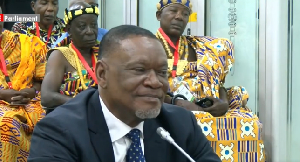 Justice Senyo Dzamefe is a Supreme Court nominee
Justice Senyo Dzamefe is a Supreme Court nominee
Supreme Court nominee, Justice Senyo Dzamefe, has called for the introduction of strict timelines for the resolution of criminal and civil cases in the courts to accelerate the pace of justice delivery in the country.
Appearing before the Appointments Committee of Parliament on Monday, June 16, 2025, he explained that time-bound litigation would compel all parties, including the judiciary, to work within defined schedules, thereby curbing unnecessary delays that often frustrate litigants.
“I think we must set timelines for cases. Let’s say criminal cases, three months; civil, six months. There must be a timeline. Then the parties, as well as the court, know that we are within a certain time period to finish cases,” he stated.
Justice Dzamefe argued that true reform of the justice system must start by prioritising the people who keep the system running, which is the human resource.
“Think of the human resource, that is a mistake a lot of people make. First, think of those who give you the product,” he stressed.
“So, Mr. Chairman, the first is to motivate the staff,” he added.
Justice Dzamefe also mentioned that one of the key reasons for the slow pace of justice is the overloading of a few courts with too many cases.
The Supreme Court nominee further suggested that expanding court infrastructure would help decentralise caseloads and ensure more efficient adjudication.
“If you want work to go on fast, you mustn’t load one entity too much. So, what do we do? We need more courts. When we have more courts, the job is spread thin and it goes faster,” he explained.
Beyond infrastructure and staffing, Justice Dzamefe pointed out the urgent need to invest in modern tools and adopt new technologies, especially artificial intelligence, to streamline court processes.
“The time of long handwriting is past, so we have to go to AI tools like voice recording and transcription, so that by the end of the day, just as the court is sitting, the records are ready,” he said.
He also proposed a nationwide rollout of virtual courts, noting that this would reduce the number of adjournments and eliminate the need for physical presence in some cases.
“When you have virtual courts, you can still give evidence wherever you are, and the case goes on,” he explained.
JKB/MA
Meanwhile, watch the latest news in Twi on GhanaWeb TV below:
